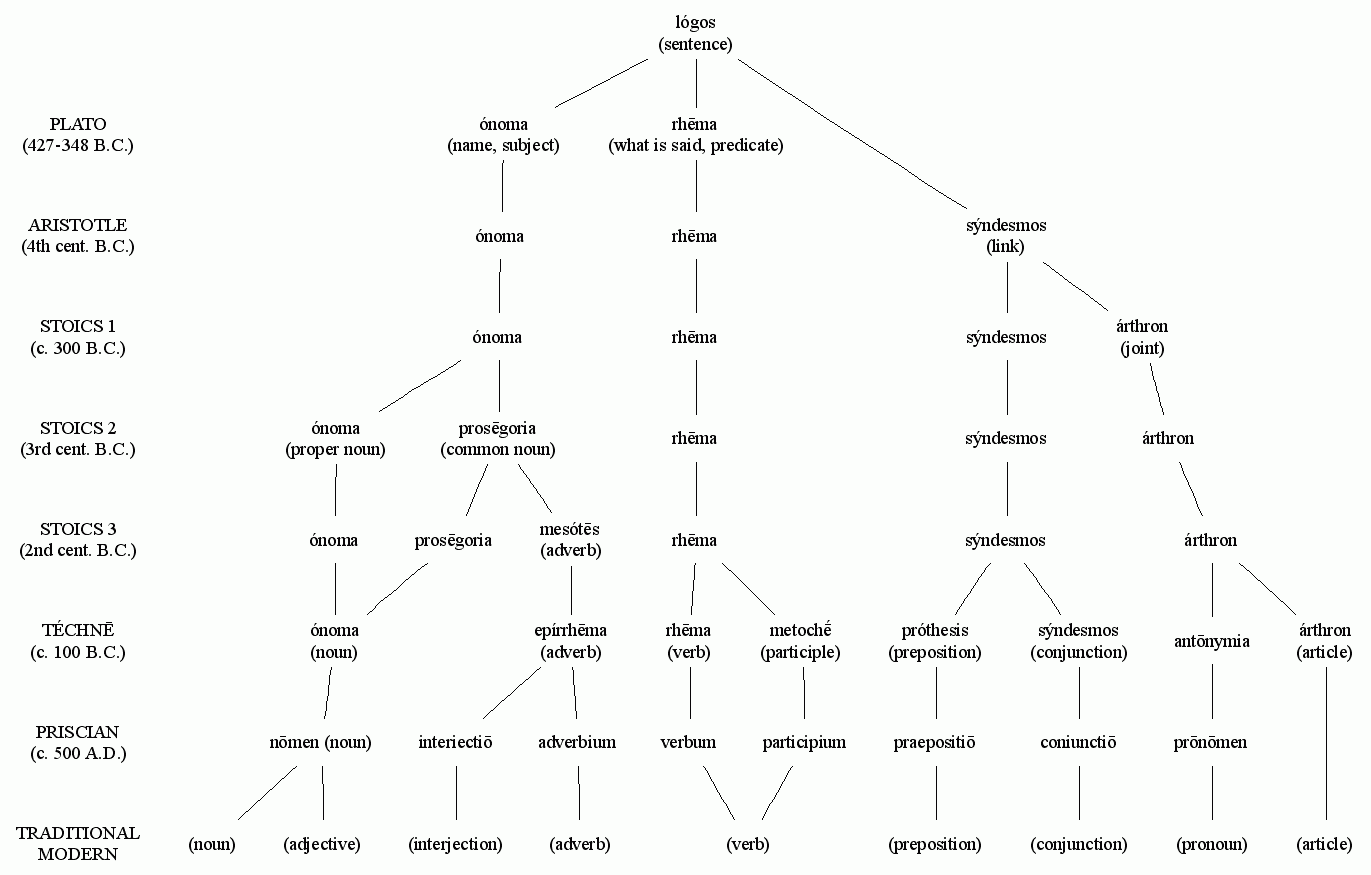2021-02-20 Sat
■ #4317. なぜ「格」が "case" なのか [terminology][case][grammar][history_of_linguistics][etymology][dionysius_thrax][sobokunagimon][latin][greek][vocative]
本ブログでは種々の文法用語の由来について「#1257. なぜ「対格」が "accusative case" なのか」 ([2012-10-05-1]),「#1258. なぜ「他動詞」が "transitive verb" なのか」 ([2012-10-06-1]),「#1520. なぜ受動態の「態」が voice なのか」 ([2013-06-25-1]),「#3307. 文法用語としての participle 「分詞」」 ([2018-05-17-1]),「#3983. 言語学でいう法 (mood) とは何ですか? (1)」 ([2020-03-23-1]),「#3984. 言語学でいう法 (mood) とは何ですか? (2)」 ([2020-03-24-1]),「#3985. 言語学でいう法 (mood) とは何ですか? (3)」 ([2020-03-25-1]) などで取り上げてきた.今回は「格」がなぜ "case" と呼ばれるのかについて,連日参照・引用している Blake (19--20) より概要を引用する.
The term case is from Latin cāsus, which is in turn a translation of the Greek ptōsis 'fall'. The term originally referred to verbs as well as nouns and the idea seems to have been of falling away from an assumed standard form, a notion also reflected in the term 'declension' used with reference to inflectional classes. It is from dēclīnātiō, literally a 'bending down or aside'. With nouns the nominative was taken to be basic, with verbs the first person singular of the present indicative. For Aristotle the notion of ptōsis extended to adverbial derivations as well as inflections, e.g. dikaiōs 'justly' from the adjective dikaios 'just'. With the Stoics (third century BC) the term became confined to nominal inflection . . . .
The nominative was referred to as the orthē 'straight', 'upright' or eutheia onomastikē 'nominative case'. Here ptōsis takes on the meaning of case as we know it, not just of a falling away from a standard. In other words it came to cover all cases not just the non-nominative cases, which in Ancient Greek were called collectively ptōseis plagiai 'slanting' or 'oblique cases' and for the early Greek grammarians comprised genikē 'genitive', dotikē 'dative' and aitiatikē 'accusative'. The vocative which also occurred in Ancient Greek, was not recognised until Dionysius Thrax (c. 100 BC) admitted it, which is understandable in light of the fact that it does not mark the relation of a nominal dependent to a head . . . . The received case labels are the Latin translations of the Greek ones with the addition of ablative, a case found in Latin but not Greek. The naming of this case has been attributed to Julius Caesar . . . . The label accusative is a mistranslation of the Greek aitiatikē ptōsis which refers to the patient of an action caused to happen (aitia 'cause'). Varro (116 BC--27? BC) is responsible for the term and he appears to have been influenced by the other meaning of aitia, namely 'accusation' . . . .
この文章を読んで,いろいろと合点がいった.英語学を含む印欧言語学で基本的なタームとなっている case (格)にせよ declension (語形変化)にせよ inflection (屈折)にせよ,私はその名付けの本質がいまいち呑み込めていなかったのだ.だが,今回よく分かった.印欧語の形態変化の根底には,まずイデア的な理想形があり,それが現世的に実現するためには,理想形からそれて「落ちた」あるいは「曲がった」形態へと堕する必要がある,というネガティヴな発想があるのだ.まず最初に「正しい」形態が設定されており,現実の発話のなかで実現するのは「崩れた」形である,というのが基本的な捉え方なのだろうと思う.
日本語の動詞についていわれる「活用」という用語は,それに比べればポジティヴ(少なくともニュートラル)である.動詞についてイデア的な原形は想定されているが,実際に文の中に現われるのは「堕落」した形ではなく,あくまでプラグマティックに「活用」した形である,という発想がある.
この違いは,言語思想的にも非常におもしろい.洋の東西の規範文法や正書法の考え方の異同とも,もしかすると関係するかもしれない.今後考えていきたい問題である.
・ Blake, Barry J. Case. 2nd ed. Cambridge: CUP, 2001.
2012-10-06 Sat
■ #1258. なぜ「他動詞」が "transitive verb" なのか [terminology][verb][grammar][history_of_linguistics][etymology][dionysius_thrax][sobokunagimon]
昨日の記事「#1257. なぜ「対格」が "accusative case" なのか」 ([2012-10-05-1]) に引き続き,文法用語の問題について.術後一般にいえることだろうが,文法用語には意味が自明でないものが多い.例えば,他動詞を "transitive verb" ,自動詞を "intransitive verb" と呼んでいるが,transitive とは何のことを指すのだろうか.
transitive は,語源的にはラテン語 transitīvus に遡り,その基体となる動詞は transīre (trans- "over" + īre "to go") である.transitive は,全体として "going over, passing over" ほどの意味となる.OED で "transitive, a. (n.)" の語義およびその例文の1つを確認すると,次のようにあった.
2. a. Gram. Of verbs and their construction: Expressing an action which passes over to an object; taking a direct object to complete the sense.
. . . .
1590 J. Stockwood Rules Constr. 64 A verbe transitiue .. is such .. as passeth ouer his signification into some other thing, as when I say, 'I loue God'.
ここから,動詞の表わす動作の影響が他のもの(目的語の指示するもの)へ「及ぶ」「伝わる」という点で,"going over, passing over" なのだとわかる.
verbum transitīvum "transitive verb" という用語そのものではなくとも,動詞のこのとらえ方は,2世紀に古代ギリシア語文法を著わした Apollonius Dyscolus に帰せられる.Dionysius Thrax の Techne Grammatike を継承し,後の Priscian のラテン語文法にも大きな影響を与えた偉大な文法学者である.Dyscolus は,名詞(の格)と動詞の関係に注目し,動詞の用法を transitive, intransitive, passive へと分類した.言語学史における Dyscolus の評価を,Robins (47) より引用しておこう.
Syntax was dealt with extensively by Apollonius Dyscolus writing in Alexandria in the second century A. D. He wrote a large number of books, only some of which survive, and it would appear that despite earlier writings on Greek syntax his was the first attempt at a comprehensive syntactic description and analysis of the Greek language. His importance, together with that of the Téchnē, was realized by his successors, and the great Latin grammarian, Priscian, some three centuries later referred to him as 'the greatest authority on grammar', and explicitly imposed Apollonian methods on his own full-scale description of the Latin language.
・ Robins, R. H. A Short History of Linguistics. 4th ed. Longman: London and New York, 1997.
2012-10-04 Thu
■ #1256. 西洋の品詞分類の歴史 [dionysius_thrax][grammar][greek][latin][pos][history_of_linguistics]
西洋の文法論,とりわけ品詞論には,約2400年の連綿と続く歴史がある.紀元前5世紀後半に現われた Plato (427?--?348 B.C.) が,文の構成要素を ónoma (name, subject) と rhēma (what is said, predicate) へ大別することに端を発した分類は,Aristotle (384--322 B.C.) により sýndesmos (link) を加えられて後代へ受け継がれた.
紀元前3世紀より,ストア派の学者は3段階にわたり,ónoma, rhēma, sýndesmos の3区分をさらに細分化していった.その過程で彼らは固有名詞と普通名詞を区別するなどの新機軸をもたらしたが,これは中世へは継承されなかった.ストア派は品詞論の主流とはならず,代わりにアレクサンドリア学派が台頭した.紀元前100年頃に出た Dionysius Thrax はアレクサンドリア学派の流れを汲むが,ストア派の伝統も無視はしておらず,むしろその対立の中から,[2011-10-06-1]の記事で取り上げたギリシア語文法の超ロングセラー Techne Grammatike を著わした.8品詞の伝統の元祖である.この文法書は,初期キリスト教の時代にアルメニア語や古代シリア語へも翻訳されたし,ビザンティンの批評家や古典注釈者の対象テキストともなり,実に13世紀ものあいだ,西洋世界で圧倒的な権威を誇ることになる (Robins 38) .そして,その伝統は,ギリシア語,ラテン語などの古典語のみならず英語を含めた現代語の文法論にも確実に息づいている.
とはいっても,Techne Grammatike の文法論が完全に改変されずに中世へ継承されたわけではない.例えば,現代でいうところの伝統文法では名詞と形容詞は区別されているが,Techne では ónoma としてまとめられている.今でも "substantive" という用語が聞かれることがあるが,これは名詞と形容詞を包括する用語である.逆に,現代の伝統文法では,分詞は動詞の下位区分として非独立的だが,Techne では動詞とは独立した1つの範疇を形成していた.
古代ギリシア以降の品詞論の変遷を,Robins (42) に図示されている通りに再現したので,参考までに(クリックで拡大).

・ Robins, R. H. A Short History of Linguistics. 4th ed. Longman: London and New York, 1997.
2011-10-06 Thu
■ #892. 文法の父 Dionysius Thrax の形態論 [derivative][compound][grammar][greek][word_formation][dionysius_thrax]
[2011-09-27-1]の記事「#883. Algeo の新語ソースの分類 (1)」で,西洋における体系文法の父と称されるギリシアの文法学者 Dionysius Thrax (c100BC) に言及した.彼の著わした Techne Grammatike は,小冊子ながらも,千年以上もの間標準テキストとして用いられた,極め付きのロングセラーである.今回は,Davidson による英訳により,Thrax が語形成について述べている箇所を読んでみた.ギリシア語の知識および当時の世界観を持ち合わせていないので,Thrax の語形成の分類は随分と独特に見えるが,英語の語形成を考える上で何か参考になるかもしれないので,概要を記したい.
Thrax は,Section 14 で名詞には2つの Species があると論じている.1つは primitive で,もう1つは derivative である.現代の形態論の用語でいえば,前者は語根あるいは simplex,後者は派生語あるいは complex に相当するだろう.派生語は7種類が区別されているが,その基準は意味だったり機能だったりで仕分けに統一がない.その7つとは,Patronymics, Possessives, Comparatives, Diminutives, Nominals, Superlatives, Verbals である.これらにより派生名詞が作り出されることになる.
一方,Thrax は名詞には3つの Forms があると論じている.1つ目は simple で,2つ目は compound で,3つめは super-compound である.それぞれの例として,Memnon, Agamemnon, Agamemnonides を挙げている.compound には4種類が区別されており,語形成論としては興味深い.(1) 2つの完全語からなるもの (ex. Cheirisophos), (2) 2つの不完全語からなるもの (ex. Sophokles, (3) 1つの不完全語と1つの完全語からなるもの (ex. Philodemos), (4) 1つの完全語と1つの不完全語からなるもの (ex. Periklês) .
Thrax の語形成論は独特であり,直接これを英語に応用できるわけではないが,自由形態素と拘束形態素の区別を意識している点は注目に値する.primitive や simple という用語も,英語形態論に導入すると便利そうである.
派生と複合を明確に区別する Thrax の伝統は,現代英語形態論にも概ね受け継がれているようだ.
・ Davidson, Thomas, trans. "The Grammar of Dionysios Thrax." Journal of Speculative Philosophy 8 (1874): 326--39.
Powered by WinChalow1.0rc4 based on chalow